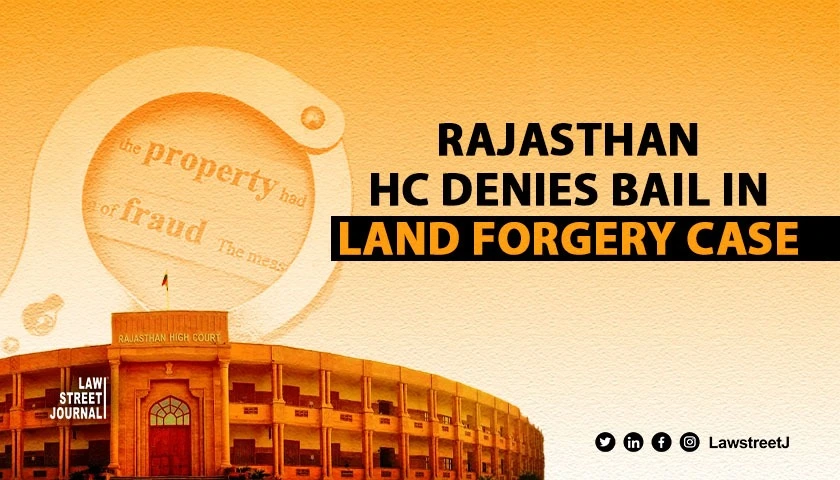Rajasthan: The Rajasthan High Court recently rejected an anticipatory bail application filed by an accused facing multiple FIRs for allegedly concocting and forging land ownership documents (pattas) purportedly issued by the Ajmer Development Authority (ADA) and extracting lakhs of rupees from victims under the pretext of handing over these forged documents.
The case revolves around four FIRs registered against the accused for fabricating pattas and taking lakhs of rupees from victims for handing over these forged documents.
The counsel for the accused argued that despite the investigations being clubbed together, the accused was arrested only in one FIR and not in the other three FIRs, asserting that the accused cannot be repeatedly arrested for the purpose of recovery, as only one patta was recovered at his instance during the initial arrest.
The counsel further claimed that the prosecution was unclear about the creator of the forged documents and that the accused had appeared for interrogation on multiple occasions, yielding no concrete evidence against him. Additionally, the counsel also asserted that lodging repeated FIRs for the same allegations amounted to an abuse of the legal process.
However, the prosecution, represented by the Public Prosecutor and Senior Counsel for the complainant, vehemently opposed the anticipatory bail applications. They highlighted that in FIR No. 163/2021, the co-accused Vinit Mahawar was granted regular bail after the completion of the investigation and filing of the chargesheet, which concluded that the accused had destroyed evidence related to the forged pattas.
The prosecution further alleged that while enjoying interim protection granted by the court, the accused threatened a material witness and the complainant, leading to criminal complaints being filed against him under Sections 107/116(3) of the CrPC.
The court subsequently vacated the interim protection order. Significantly, the prosecution claimed that Dilip Sharma had prepared a fabricated application purportedly for a civil writ petition before the court, which was denied by the Registrar upon verification. Additionally, a recent FIR (No. 117/2024) was lodged against the accused, alleging an audio conversation where he admitted to returning Rs. 42 lakhs instead of Rs. 50 lakhs, further implicating him in the alleged offenses.
After extensively considering the submissions of both parties and the material on record, the court, while acknowledging the need to exercise caution while deciding anticipatory bail applications, focused on prima facie issues and reasonable grounds, rather than delving into a detailed analysis of evidence.
The court noted the gravity of the allegations, the nature of the offenses involved, and the fact that multiple FIRs were lodged against the accused for similar offenses related to the creation of forged land documents. It also highlighted the prosecutions claims that the accused had threatened witnesses as well as the complainant while enjoying interim protection, demonstrating a propensity to influence the course of justice.
The court also found the allegations of the accused preparing a fabricated application for a civil writ petition and the recent FIR involving an audio conversation concerning the return of money to be significant factors weighing against the grant of anticipatory bail.
Considering the fact that with regard to similar nature of allegations of creation of forged, fabricated pattas and documents, five FIRs have been lodged against the petitioner and keeping the aforesaid in mind and also considering the nature of allegation and gravity of the matter, this Court does not deem it proper to accept these bail applications, the court stated while rejecting the anticipatory bail applications.
In its conclusion, the court emphasized the need for a thorough investigation into the serious allegations against the accused. Additionally, the court, after citing the gravity of the matter, the nature of the alleged offenses, and the multiple FIRs lodged, deemed it appropriate to reject the anticipatory bail applications.



![Women cant be denied job for not being married: Rajasthan High Court [Read Judgment]](/secure/uploads/2023/09/lj_8336_fbfe7a8f-f672-4a69-86ba-ba50c8f28544.jpg)
![In process of bringing in legislation to control illegal conversion, Rajasthan government tells SC [Read Affidavit]](/secure/uploads/2024/06/lj_7804_4d18824f-bf38-4bec-94a9-c9886787ad92.webp)
![Rajasthan HC slams govt over 16-Year delay in AIIMS Jodhpur Projects, Warns of Rs. 50 Crore Penalty [Read Order]](/secure/uploads/2024/12/lj_9853_Rajasthan_HC_slams_govt_for_16_year_delay_in_AIIMS_Jodhpur_Project.jpg)




